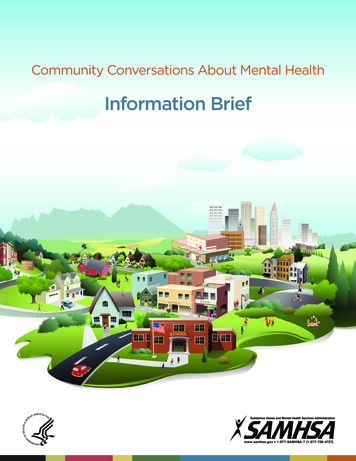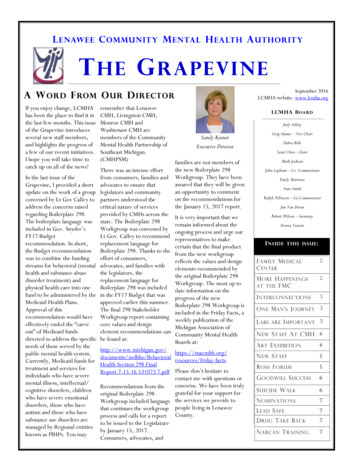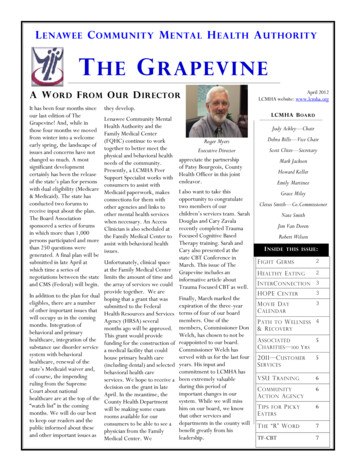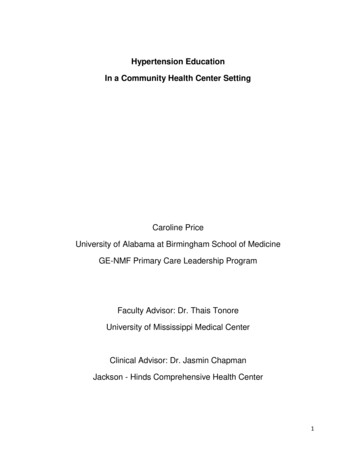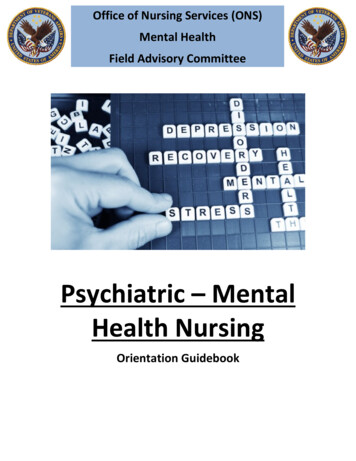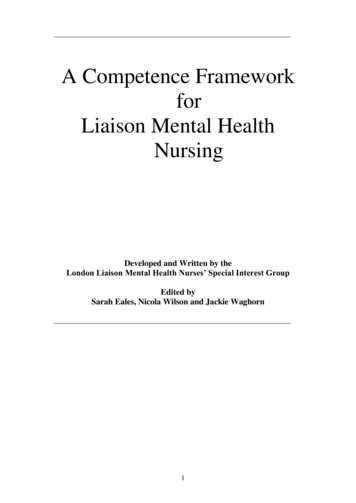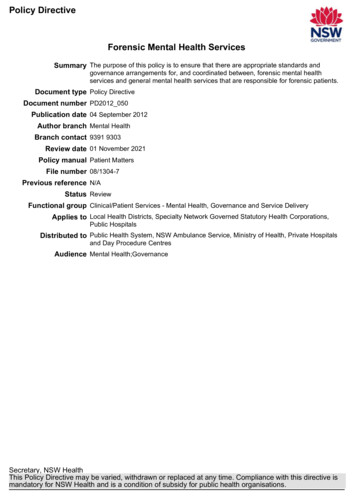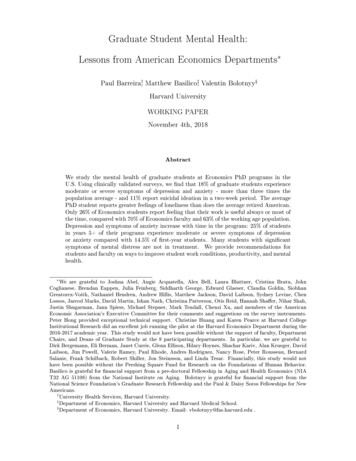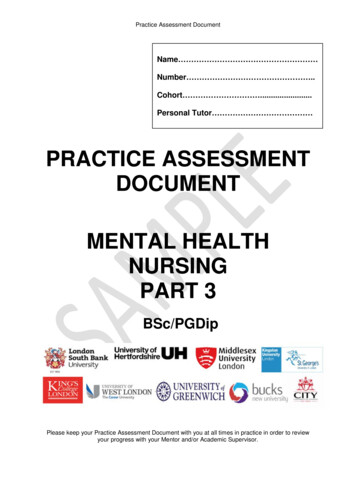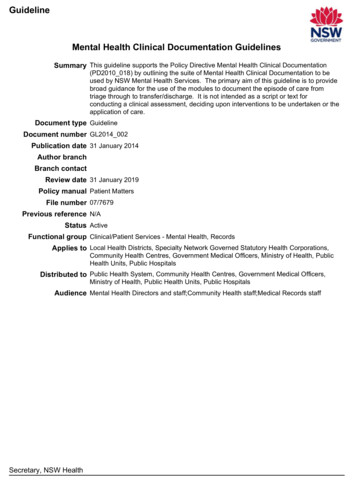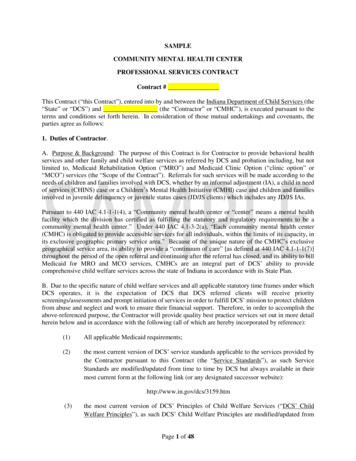
Transcription
SAMPLECOMMUNITY MENTAL HEALTH CENTERPROFESSIONAL SERVICES CONTRACTContract #This Contract (“this Contract”), entered into by and between the Indiana Department of Child Services (the“State” or “DCS”) and (the “Contractor” or “CMHC”), is executed pursuant to theterms and conditions set forth herein. In consideration of those mutual undertakings and covenants, theparties agree as follows:1. Duties of Contractor.A. Purpose & Background: The purpose of this Contract is for Contractor to provide behavioral healthservices and other family and child welfare services as referred by DCS and probation including, but notlimited to, Medicaid Rehabilitation Option (“MRO”) and Medicaid Clinic Option (“clinic option” or“MCO”) services (the “Scope of the Contract”). Referrals for such services will be made according to theneeds of children and families involved with DCS, whether by an informal adjustment (IA), a child in needof services (CHINS) case or a Children’s Mental Health Initiative (CMHI) case and children and familiesinvolved in juvenile delinquency or juvenile status cases (JD/JS clients) which includes any JD/JS IAs.Pursuant to 440 IAC 4.1-1-1(4), a “Community mental health center or “center” means a mental healthfacility which the division has certified as fulfilling the statutory and regulatory requirements to be acommunity mental health center.” Under 440 IAC 4.1-3-2(a), “Each community mental health center(CMHC) is obligated to provide accessible services for all individuals, within the limits of its capacity, inits exclusive geographic primary service area.” Because of the unique nature of the CMHC’s exclusivegeographical service area, its ability to provide a “continuum of care” [as defined at 440 IAC 4.1-1-1(7)]throughout the period of the open referral and continuing after the referral has closed, and its ability to billMedicaid for MRO and MCO services, CMHCs are an integral part of DCS’ ability to providecomprehensive child welfare services across the state of Indiana in accordance with its State Plan.B. Due to the specific nature of child welfare services and all applicable statutory time frames under whichDCS operates, it is the expectation of DCS that DCS referred clients will receive priorityscreenings/assessments and prompt initiation of services in order to fulfill DCS’ mission to protect childrenfrom abuse and neglect and work to ensure their financial support. Therefore, in order to accomplish theabove-referenced purpose, the Contractor will provide quality best practice services set out in more detailherein below and in accordance with the following (all of which are hereby incorporated by reference):(1)All applicable Medicaid requirements;(2)the most current version of DCS’ service standards applicable to the services provided bythe Contractor pursuant to this Contract (the “Service Standards”), as such ServiceStandards are modified/updated from time to time by DCS but always available in theirmost current form at the following link (or any designated successor website):http://www.in.gov/dcs/3159.htm(3)the most current version of DCS’ Principles of Child Welfare Services (“DCS’ ChildWelfare Principles”), as such DCS’ Child Welfare Principles are modified/updated fromPage 1 of 48
time to time by DCS but always available in their most current form at the following link(or any designated successor website):http://www.in.gov/dcs/3159.htmPlease note: All services (even individual services) are provided through the lens of childsafety. As part of service provision, it is the responsibility of the Contractor to understandthe child safety concerns and protective factors that exist within the family. Continualassessment of child safety and communication with the Local DCS Office is required. It isthe responsibility of the Contractor to report any safety concerns, per state statue, IC § 3133-5-1. All service plans should include goals that address issues of child safety and thefamily’s protective factors. The monthly reports must outline progress towards goalsidentified in the service plans;(4)the Contractor’s Response to the Community Mental Health Center RFP (which includesthe Contractor’s Response to any necessary supplemental Request(s) for Proposal(s)), asrefined based on any subsequent Contractor agreement to services or rates) (the“Contractor’s RFP Response”), which was submitted by the Contractor in accordance withthe specifications of the Community Mental Health Center RFP; and(5)the summary list of all of the specific service(s) provided by this particular Contractor andthe applicable service rates approved by DCS which are detailed in the services and ratesschedule, Attachment 1, (which is attached hereto and hereby incorporated by reference)and paid in accordance with the specifications outlined in paragraph D below.However, should any information detailed in the “Service Narrative” (Attachment D to theCommunity Mental Health Center RFP) submitted by Contractor conflict with the ServiceStandards, the requirements set forth in the Service Standards shall control.C. The Contractor agrees to comply with all terms, provisions and conditions applicable to the services itprovides to the State pursuant to this Contract, including, but not limited to, service categories, objectives,DCS’ Service Standards applicable at the time services are rendered, and DCS’ Child Welfare Principles,as set forth above in paragraph B of this Section, and the following assurances made in conjunction withthe Community Mental Health Center RFP and the Contractor’s RFP Response, except to the extent thatthe terms of this Contract might specifically modify those statements, provisions, and assurances. Theassurances (“Assurances”) can be found at the following link (or any designated successor website):http://www.in.gov/dcs/3159.htm(1) In recognition of DCS’ overall responsibility for case management and its unique knowledgeof the children and families, CMHC agrees to collaborate with DCS and its assigned family casemanager (“FCM”) in determining specific staff for services. CMHC acknowledges that it is theDCS case plan and the child and family team meeting (“CFTM”) which will determine all nonMRO services. However, DCS acknowledges CMHC responsibility for coordination and casemanagement related to medically necessary behavioral health services. DCS service standards willcontrol for any services not billed to Medicaid. However, even for Medicaid-eligible services,Page 2 of 48
CMHC agrees that DCS standards will prevail when compatible with Medicaid service standards.For example, “home-based” services for DCS purposes are to be delivered primarily in the homeeven though Medicaid may define “home-based” as services delivered away from the clinic, butnot necessarily in the home. CMHC also agrees that it will follow DCS’ best practices. This mayrequire services such as sending a staff member involved in the case to a child and family teammeeting which may not be billable to Medicaid. DCS acknowledges that it will be responsible forpayment of preapproved services not billable to Medicaid.(2) DCS agrees to provide timely referrals, which may include verbal, e-mail, text or other nonformal referrals in emergency situations. Such referrals will be followed up with formal electronicor hard-copy referrals. CMHC agrees to provide timely care in accordance with DCS processesand protocols for service delivery. Parties acknowledge that client circumstances may affectscheduling of actual service delivery, but that CMHC will initiate contact and will follow throughwith services as soon as required by the service standards and as possible given clientcircumstances. Parties also acknowledge that DCS may have to make an alternate referral shoulda child or family be unavailable for the original service referred and that CMHC will only bill forreferrals pursuant to those services which were actually rendered. CMHC will conduct clinicalintake to determine diagnosis at the earliest opportunity unless DCS directs otherwise because ofan emergency. For Medicaid eligible clients, CMHC will bill as crisis intervention as appropriateand with reference to 405 IAC 5-21.5-8 and the Indiana Medicaid Rehabilitation Option ProviderManual.(3) For referrals made pursuant to this agreement, CMHC agrees to modify any policy restrictingservices for prior clients with unpaid bills; however nothing herein prohibits CMHCs from pursuingunpaid bills. CMHC also agrees to modify any agreements or understandings with other providerswith respect to boundaries for service delivery as such understandings might limit or interfere withDCS referrals. CMHC will serve all clients referred by DCS irrespective of those policies.(4) Contractor acknowledges that DCS may continue to refer clients to other providers for bothMedicaid eligible and non-Medicaid eligible services as appropriate to its agency mission and theneeds of the DCS population.(5) Contractor agrees that it will hire or lease employees as necessary to deliver the Medicaideligible services available under this agreement and that it will hire staff or subcontract as necessaryto deliver services which are not Medicaid-eligible but which are available hereunder. Contractoragrees that all expectations in this agreement apply equally to Contractor's staff whether they areregular employees, leased employees or subcontractors. Contractor agrees that the cost of suchservices to DCS, including administrative costs, will not exceed the rate DCS had paid forequivalent services under direct contracts.(6) A key part of the CMHC's initial service to DCS will be to help determine the appropriatefollow up service referrals to address the client's needs. This may be: represented in the service recommendation following an assessment for MRO;Page 3 of 48
reflected in service recommendations following a diagnostic and evaluation orsubstance abuse assessment; ora recommendation for an assessment for MRO if the CMHC’s CANS score for a childis three (3) or above or reveals a significant behavioral health need appropriate torequest prior authorization for Medicaid services. CMHC will contact the DCS FCMto request an assessment for MRO if needed and will pursue approval for MROservices as client needs warrant. Also, CMHC will pursue PA if the CMHC identifiesmedical necessity and/or if there is a court order for services which could be coveredby Medicaid.(7) CMHC will pursue Medicaid eligibility determinations on all potentially eligible DCS clients,including adults where appropriate. CMHC may request assistance from the DCS MedicaidEligibility Unit ("MEU") or any successor resource. Parties will develop and implement a processto avoid duplicate applications for Medicaid eligibility. DCS' FCMs will attempt to connect adultclients with CMHCs.(8) CMHC agrees that it will consult with the Indiana Family and Social Services Administration("FSSA") Office of Medicaid Policy and Planning ("OMPP") and with other resources as necessaryto appropriately code services to ensure maximum Medicaid reimbursement.(9) CMHC agrees to obtain prior authorization as required and to otherwise use its expertise toguide selection and delivery of services to ensure maximum reimbursement. Parties acknowledgethat standard Medicaid Rehabilitation Option ("MRO") packages may be designed for clients withaverage needs, but that DCS clients may not fit that need level and may require more services.CMHC will advocate for approval of the level of client service it determines is actually necessary.CMHC may avail itself of any funding opportunities available through DCS or FSSA, respectively,for the cases for which each agency is responsible. DCS and CMHC agree to cooperate and tocoordinate with FSSA's Division of Family Resources ("DFR") as necessary to facilitateapplication for Medicaid. CMHC agrees to first bill Medicaid for all Medicaid-eligible services forall Medicaid-eligible clients and to be responsible for compliance with all Medicaid rules andregulations concerning DCS' clients' treatment. CMHC will only seek payment from DCS for suchMedicaid-eligible services if Medicaid has denied payment and appeals. CMHC will holdinvoicing for clients whose Medicaid eligibility is pending. Once an eligibility determination ismade, CMHC will bill Medicaid as described above, for those who are eligible. For those who arenot Medicaid eligible, CMHC will bill DCS.(10) CMHC agrees that it will assign experienced staff to DCS cases in order to maximizeMedicaid reimbursement by: properly identifying crisis interventions;monitoring appropriate diagnoses;segregating Medicaid billable and non-billable components of services [e.g. certainrecreation, education, transportation and employment services];managing details of service delivery (signatories for treatment plans, case loadlimitation, etc.);timely initiating and communicating with Managed Care Organizationsregarding prior approvals; andPage 4 of 48
timely (at least two weeks prior) notifying DCS of and initiating a redeterminationnecessary to continue services as patient needs dictate. CMHC should complete a newservice recommendation at the 6 month mark when it completes its redetermination.This obligation applies to patients initially referred pursuant to this agreement, to thosewho were in services under a DCS case prior to this agreement and to those who werepreviously being served with no DCS involvement who later become involved withDCS. For those patients who were not DCS clients at the time of their initial treatmentby CMHC, DCS will send a referral to initiate the Medicaid match and CMHC willsend DCS a copy of the assessment supporting the services to be covered, but will notduplicate an assessment.(11) For services with both Medicaid eligible and non-Medical eligible components, CMHC willbill the Medicaid eligible portion of services for reimbursement prior to billing DCS.(12) Contractor may provide services based on both medical necessity and DCS' safetyconsiderations. Contractor will split invoices in to those eligible for federal reimbursement andsubject to state match and those which are not.(13) CMHC agrees to bill all Medicaid-eligible services payable by DCS at the lesser of Medicaidrates or the agreed statewide DCS services rates for CMHCs. CMHC agrees to identify, file for andpursue reimbursement from private insurance as available. CMHC agrees to bill at statewide ratesincluded on Attachment 1 for all services which are not payable by Medicaid.(14)Contractor may close client cases per Contractor protocols, but DCS may elect to leave areferral open on a case closed by Contractor should it anticipate the need for additional services.In any event, DCS will no longer be responsible for payment of services once the DCS case isclosed.D. As described above, the purpose of this Contract is to secure behavioral health and other child welfareservices according to the needs of children and families involved with DCS, whether by an informaladjustment (IA), a child in need of services (CHINS) case or a Children’s Mental Health Initiative (CMHI)case, and children and families involved in juvenile delinquency or juvenile status cases (JD/JS clients)which includes any JD/JS IAs.The CMHC contracts are statewide, and invoices shall reflect those services available from CMHCs asdescribed in Attachment 1 hereto. Any changes to the services within the Scope of the Contract (andtheir accompanying rates) may be accomplished by written notice from the State to the Contractor asdetailed in Section 31 [Merger & Modification] herein.The parties acknowledge that the Contractor may not have the staff or staff with the proper credentials toprovide the complete array of services available under this Contract at the time this Contract begins andthat the availability of certain services (such as one-hour crisis response) may vary on a county by countybasis and over the term of the Contract. The Contractor explicitly agrees that it will only accept referralsfor which it has adequate and properly credentialed staff at the time of the referral. The Contractor may beaudited by DCS and/or Family and Social Services Administration’s Division of Mental Health &Addiction (“DMHA”) and/or the applicable credentialing or certification organization to ensurecompliance. Furthermore, the Contractor explicitly agrees that it will comply with any required statelicensing requirements (for itself and those of its employees) for the services performed under this Contract,as set forth in more detail in Section 30 [Licensing Standards]. The Contractor will provide DCS' centralPage 5 of 48
office and the DCS Regional Coordinator for the areas in which it operates with timely updates of theservices it is qualified to offer. The DCS Regional Coordinator and DCSRegional Manager will notify the Regional Service Councils of any changes to the services available withineach region. Contractor acknowledges that DCS may refer cases as DCS' needs dictate and not solely basedon proximity of the client to a particular CMHC. The Contractor agrees that its staff will provide servicesand supervision appropriate to their level of training and will document time accordingly.Award of this contract is based on Contractor’s strict compliance with the certification, training, and/oreducation requirements set forth in the Service Standards, regardless of Contractor’s response in theCommunity Mental Health Center RFP.E. Releases: The Contractor shall be required to have current releases for all DCS' clients and JD/JS clientsfor whom the Contractor's Staff provides or has provided services pursuant to this Contract with anexpiration tied to closure of the relevant CHINS case or JD/JS case. If a case begins as an IA (informaladjustment), the expiration should be tied to a reasonable expiration date to cover the later of potentialappearance requests or the closure of any successor CHINS case. It is Contractor’s responsibility to monitorthe expiration dates of the releases and obtain subsequent, signed releases for all DCS’ clients and JD/JSclients throughout the entire CHINS case or JD/JS case. DCS has created certain consent and release formsto ensure consistency among providers and Contractor agrees to use such forms as long as they complywith all applicable legal requirements.Contractor also agrees to seek such consent and release forms from all clients related to DCS casesregardless of whether DCS is payor. Should any clients refuse or be unable to execute the requestedreleases, Contractor will promptly notify DCS and provide documentation to DCS of such refusals orinability so DCS may seek a court order.F. Appearances:(1)The Contractor agrees that the services provided under this Contract may require it toappear in court or appeals hearings, as well as in miscellaneous administrative hearingsand/or require its participation in deposition(s) (hereinafter referred to as "Appearance(s)"or "Appear(s)"). Due to the nature of behavioral health and child welfare services, theparties acknowledge that any such Appearances may be long after the behavioral healthand child welfare services referral has closed. However, the Contractor’s obligation totestify will survive both the closure of the referral for behavioral health and child welfareservices and the Contract. As stated above, it is Contractor’s obligation under this Contractto have a current release for all DCS’ clients and JD/JS clients, but the lack of such releasedoes not excuse Contractor’s obligation to attend all Appearances as required under thisContract.As part of these services, the Contractor shall:(a)Require Appearance(s) of all its employees and subcontractors (the "Contractor'sStaff") as required by DCS whether or not a subpoena is sent and, if related to orarising from the services rendered pursuant to this Contract;(b)Immediately contact DCS regarding subpoenas/correspondence received,i
MRO services. However, DCS acknowledges CMHC responsibility for coordination and case management related to medically necessary behavioral health services. DCS service standards will control for any services not billed to Medicaid. However, even for Medicaid-eligible services, Page 3 of 48 CMHC agrees that DCS standards will prevail when .
